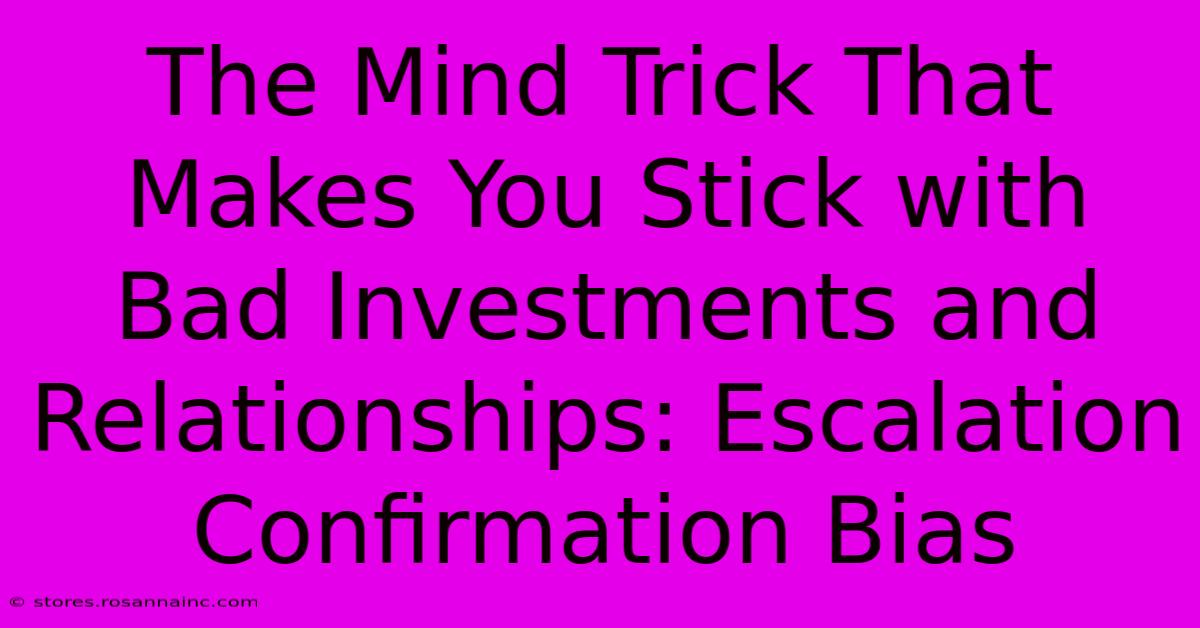The Mind Trick That Makes You Stick With Bad Investments And Relationships: Escalation Confirmation Bias

Table of Contents
The Mind Trick That Makes You Stick with Bad Investments and Relationships: Escalation of Commitment Bias
We've all been there. Stuck in a relationship that's clearly not working, or clinging to a failing investment, despite mounting evidence that we should cut our losses and move on. Why do we do this? It's often due to a powerful cognitive bias known as escalation of commitment bias, sometimes referred to as the escalation bias or the ** sunk cost fallacy**. This isn't simply stubbornness; it's a predictable mental shortcut that can have significant consequences.
Understanding Escalation of Commitment Bias
Escalation of commitment bias is the tendency to continue investing in a failing course of action even when faced with clear evidence that it's not working. This "throwing good money after bad" behavior is driven by our desire to justify past decisions and avoid admitting we were wrong. The more we've invested – whether it's time, money, or emotion – the harder it becomes to walk away, even when the rational choice is clear.
The Psychology Behind the Bias
Several psychological factors contribute to escalation of commitment:
- Cognitive Dissonance: This refers to the mental discomfort experienced when holding two conflicting beliefs. Continuing with a failing investment or relationship reduces the dissonance by avoiding the admission of a past mistake.
- Confirmation Bias: We tend to seek out information that confirms our existing beliefs and ignore information that contradicts them. This reinforces our commitment to the failing course of action, even when the evidence against it is overwhelming.
- Loss Aversion: The pain of losing something is generally felt more strongly than the pleasure of gaining something of equal value. This makes it harder to accept losses and cut ties, even when it's financially or emotionally sound.
- Sunk Cost Fallacy: This is the tendency to continue an endeavor based on the resources already invested, regardless of future potential benefits. We feel obligated to continue because we've already put so much in, even if it's a losing battle.
Escalation of Commitment in Investments
In the world of finance, escalation of commitment can lead to devastating consequences. Imagine holding onto a poorly performing stock, hoping it will eventually recover. The longer you wait, the more you've invested – both financially and emotionally – making it harder to sell and accept the loss. This can result in substantial financial setbacks. This is also true for real estate investments or business ventures, where continued investment based on sunk costs can lead to further losses.
Recognizing the Signs
Identifying escalation of commitment in your investments requires self-awareness and objective analysis. Ask yourself these questions:
- Are you basing your decisions on past investments rather than future potential?
- Are you ignoring negative information to protect your ego?
- Is the potential for future gains outweighing the risk of further losses?
- Would you make this investment if you were starting from scratch today?
If you answer "yes" to the first three questions and "no" to the last, you might be experiencing escalation of commitment bias.
Escalation of Commitment in Relationships
The emotional toll of escalation of commitment in relationships can be even greater than the financial repercussions in investments. Staying in a toxic or unhappy relationship, despite clear signs it's not working, can lead to prolonged unhappiness, resentment, and even mental health issues. Years spent hoping for change, investment in shared memories and future plans, create a sunk cost that makes leaving incredibly difficult.
Breaking the Cycle
Overcoming escalation of commitment bias requires conscious effort and a willingness to confront uncomfortable truths:
- Recognize the bias: Understanding that you're susceptible to this bias is the first step towards overcoming it.
- Seek external perspectives: Talk to trusted friends, family, or a therapist for objective feedback.
- Set clear boundaries: Establish criteria for continuing or ending an investment or relationship. Be willing to adhere to these boundaries.
- Focus on the future: Instead of dwelling on past investments, concentrate on maximizing future opportunities.
- Accept losses: Recognize that sometimes, accepting a loss is the most rational and beneficial course of action.
Conclusion:
Escalation of commitment bias is a powerful and pervasive cognitive bias that can significantly impact our financial and personal lives. By understanding the psychology behind this bias and developing strategies to mitigate its effects, we can make more rational decisions and avoid the costly consequences of clinging to failing ventures. Remember that cutting your losses doesn't equate to failure; it's often a sign of wisdom and strength.

Thank you for visiting our website wich cover about The Mind Trick That Makes You Stick With Bad Investments And Relationships: Escalation Confirmation Bias. We hope the information provided has been useful to you. Feel free to contact us if you have any questions or need further assistance. See you next time and dont miss to bookmark.
Featured Posts
-
Elevate Your Email Game Discover The Best Mailhosting For Personalized Domains
Feb 06, 2025
-
The Holy Grail Of Gel Nail Polish Why Dnd Is The Queen Of The Nail Crown
Feb 06, 2025
-
La Revolucion Del Procesamiento De Imagenes Elimina El Texto Al Instante
Feb 06, 2025
-
Unraveling The Hidden Message Of Orange Roses A Floral Tapestry Of Confidence And Passion
Feb 06, 2025
-
The Ultimate Collection Of Free Celtic Knot Tattoo Designs Find Your Perfect Match
Feb 06, 2025
